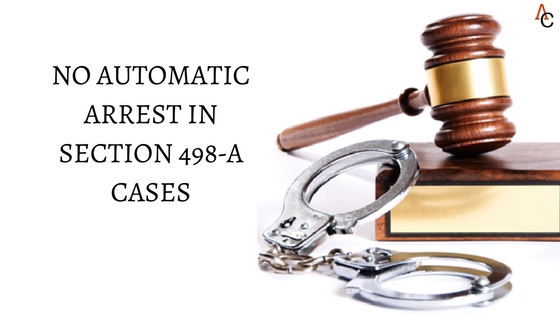Aapka Consultant Judgment Series- In this series, we are providing case analysis of Landmark Judgments of Hon’ble Supreme Court of India.
Arnesh Kumar v. State of Bihar
AIR 2014 SC 2756: (2014) 8 SCC 273
JUDGES: C.K. Prasad and Pinaki Chandra Ghose
Date of Decision: 02-07-2014
FACTS;-
The Petitioner has preferred a special leave petition before the Supreme Court after failed to secure anticipatory bail from the Ld. Sessions Judge and the High Court as he was apprehending arrest under Section 498-A of IPC, 1860 and Section 4 of the Dowry Prohibition Act, 1961. He married with the respondent no. 2 Sweta Kiran on 1st July, 2007 and thereafter the allegations levelled by the respondent against the petitioner and her in-laws was of that of the demand of Rs. eight lacs, a maruti car, an air-conditioner, television set etc. It has also been alleged that respondent was driven out of the matrimonial home due to non-fulfilment of the demand of dowry and hence the present matter.
ISSUE;-
What were the principles for making arrest and detention under the Code of Criminal Procedure?
JUDGMENT;-
The Hon’ble Supreme Court emphasized that the drastic power of arrest under the Code of Criminal Procedure, 1973 should be exercised very cautiously, as the power has been considered a tool of harassment, subjugation and surely not considered a friend of public. Arrest should be made after reasonable satisfaction resulting from due investigation as to the genuineness of the allegations as it brings humiliation, curtails freedom and casts scars forever. The conditions precedent mentioned under sec. 41(1) of the code should be satisfied before making an arrest which are- (i) to prevent such person from committing any further offence, (ii) for proper investigation of the offence, (iii) to prevent destruction of tampering with evidence by the accused, (iv) to prevent such person from making any inducement, threat or promise to any person acquainted with the facts of the case and (v) to ensure presence of the accused in the court. The police must, in any case, record reasons in writing for making or not making the arrest of any person. These aforesaid conditions shall be subject to the judicial scrutiny by the Magistrate.
Further, the Supreme Court has issued certain directions to the State Governments so that police officers do not arrest accused unnecessarily and Magistrate do not authorise detention casually and mechanically.
- All the State Governments to instruct its police officers not to automatically arrest when a case Under Section 498-A of the Indian Penal Code is registered but to satisfy themselves about the necessity for arrest under the parameters laid down above flowing from Section 41, Code of Criminal Procedure;
- All police officers be provided with a check list containing specified sub-clauses Under Section 41(1)(b)(ii);
- The police officer shall forward the check list duly filed and furnish the reasons and materials which necessitated the arrest, while forwarding/producing the accused before the Magistrate for further detention;
- The Magistrate while authorising detention of the accused shall peruse the report furnished by the police officer in terms aforesaid and only after recording its satisfaction, the Magistrate will authorise detention;
- The decision not to arrest an accused, be forwarded to the Magistrate within two weeks from the date of the institution of the case with a copy to the Magistrate which may be extended by the Superintendent of police of the district for the reasons to be recorded in writing;
- Notice of appearance in terms of Section 41A of Code of Criminal Procedure be served on the accused within two weeks from the date of institution of the case, which may be extended by the Superintendent of Police of the District for the reasons to be recorded in writing;
- Failure to comply with the directions aforesaid shall apart from rendering the police officers concerned liable for departmental action, they shall also be liable to be punished for contempt of court to be instituted before High Court having territorial jurisdiction; and
- Authorising detention without recording reasons as aforesaid by the judicial Magistrate concerned shall be liable for departmental action by the appropriate High Court.
HELD;-
The Court held that the directions aforesaid shall not only apply to the cases under Section 498-A of the IPC or Section 4 of the Dowry Prohibition Act, the case in hand, but also such cases where offence is punishable with imprisonment for a term which may be less than seven years or which may extend to seven years; whether with or without fine. It also said that neither the arrest should be made in a routine, casual and cavalier manner or on a mere allegation of commission of an offence. The appeal is allowed by the court with the directions aforesaid.
To Get Legal Opinion from Advocates/ Legal Experts, Please click here
To Get Legal Opinion from Retired Hon’ble Judges, Please click here












